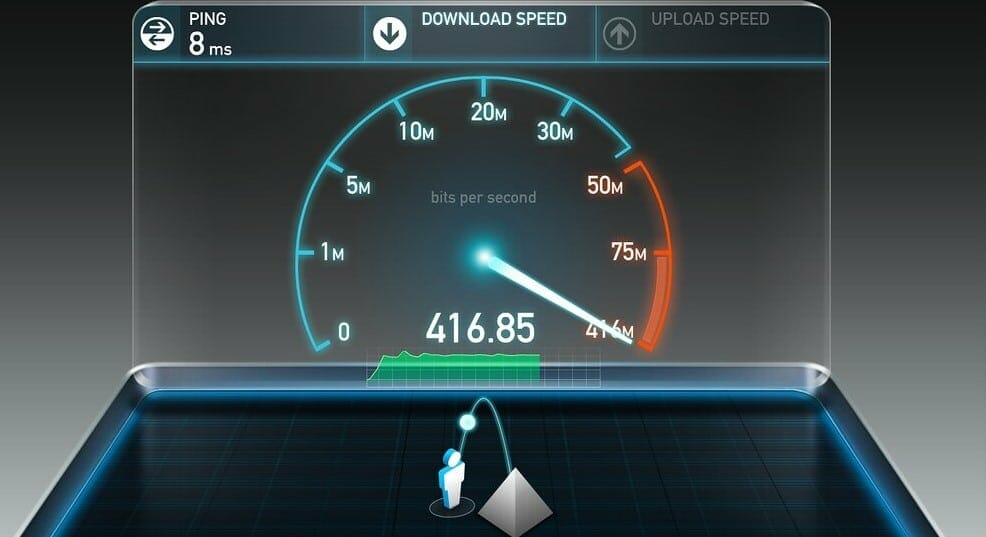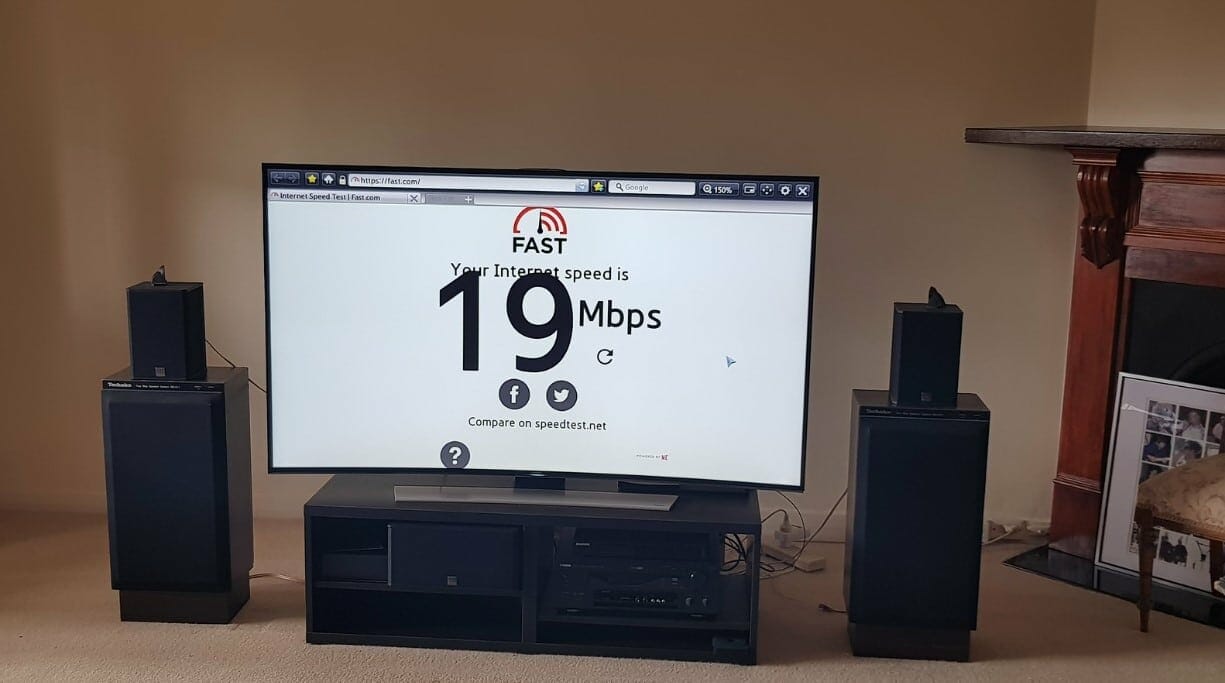Table of Contents
What is Mbps? Many have seen this abbreviation when selecting internet plans or comparing speeds, but I’m sure many are curious to know what it actually means. How are you supposed to figure out which internet plan is best for you if speeds are listed in a measurement you don’t understand? More is better, yes, but how will you know when you have enough and don’t need anymore? There’s no point in wasting money on expensive internet you don’t need, so read on and find out what does Mbps mean and how much Mbps do you need? if you want to get a good internet speed, click here first to find out.
What is Mbps?
So, what are Mbps and what does Mbps stand for? Mbps is actually an abbreviation for a measurement like you saw in science class back in grade school. Mbps stands for "megabits per second" and it is the standard for measuring the speeds of an internet plan. That's right, I said "speeds", as in plural, it was not a typo, because your internet does not come in only 1 speed. Internet plans have both an upload speed and a download speed and usually, you will see the download speed in the advertisements because it is always much higher.
Your download speed governs how quickly you can download things off the internet. This covers things like streaming videos or movies, downloading files like games, looking at that funny cat picture your friend posted, or even just browsing the web.
Every time you load a webpage or look at a picture or video your computer has to download the information to make that site run, though it is much smaller than if you downloaded the picture onto your memory system.
Upload speed determines how quickly you can send things to the internet. This is for things like sending files to your boss for work or posting pictures online, it is very important for streamers that like to stream their gameplay online.
Both of these speed types are measured in megabits per second which is where the Mbps meaning comes from.

Megabits vs Megabytes
Speaking of downloading things, you have probably seen another abbreviation of a similar nature, MBps. Unfortunately, it is not the same thing as Mbps which can be a little confusing at first. When a file is downloaded onto your computer it is stored onto your memory system, usually a Hard Disk Drive (HDD). So, what is the difference between Mbps vs MBps?
Well, the first thing you should know is that MBps stands for megabytes per second, which does look very similar to Mbps but it is for a very good reason. So, megabits per second vs megabytes per second, what is the difference? They are technically measuring the same thing. You can think of megabytes like megabits younger and bigger older brother. There are 8 megabits for every 1 megabyte which makes megabytes a better measuring solution when the numbers get a lot bigger. Why say a file is 6,200 megabits in size when you could instead say that it is 775 megabytes?
So, with that in mind, Mbps is used to measure internet speeds, and MBps is used for file sizes. That should hopefully clear up some of the mystery on the question, "what is Mbps?" but it doesn't cover the full picture. If you are curious about Mbps you are probably trying to decide what kind of internet plan is best for you, and for that, you'll need to know "how many Mbps do I need?"
How many Mbps do I need?
Having high-speed internet is great and all, but what is a good internet speed Mbps? Well, the speed you need is going to be different depending on a few factors. What do you use the internet for? How often are you using it? And how many people will be using it?
Many people use the internet for very different things. Some people just need it for communication, they just quickly take a look at social media to see what Uncle Joe posted, check their email, maybe send a few out, and then move on with their day. In that case, a very low internet speed would do just fine.
If you are a more voracious consumer of internet data, like me, you might like to spend an afternoon or two streaming a movie you like or gaming online, in which case you’ll need a much higher speed - this post will help you determine how many Mbps you need for gaming.
You also have to consider how often the internet is being used because a lot of Internet Service Providers (ISPs) cap the amount of data you can use per month. This is especially important to look out for when you are shopping around for internet services. Try to avoid data caps if you can, but if you can’t then make sure the cap is as high as possible.
Finally, you have to consider how many people are using your internet at the same time. One average speed might be great for Greg, but if Greg’s two kids Sally and Bob want to listen to music and play games while Greg is online then things will get a little slow so a faster speed might be required.
Personally, I am a frequent binge-watcher of online videos and enjoy gaming pretty frequently in my free time and I'm on the internet all day long for work and play. I currently have an internet speed of 400 Mbps and I'm very happy with it. Honestly, I could stand for it to be a lot slower and it would be perfectly fine for my needs. That said, I am the only person that actively uses the internet in my home for more than a few hours a day, which means I don’t have to compete with anyone for bandwidth.
But how many Mbps for gaming would I need? I would say something like 100 Mbps is ideal for an avid gamer or binge-watcher of movies that also has a family. If you're like Greg then this is a good speed for your situation, or you might want to jump up to 200 Mbps if things are a little slow at that speed.
For simple, everyday use and only occasional gaming or video watching 25 Mbps is fine for a single user. If you are planning to stream games online then you will need to pay more attention to your upload speed than your download speed, but either way higher is better in every situation as long as you can afford it.

What does Mbps Have to Do With Your Internet Speed?
When you are trying to figure out how internet speed is measured, internet speed is kind of like filling a bucket. Your goal is to fill the bucket with water, so you use a hose. In this analogy, using the internet is filling the bucket, and megabits are the water.
When you try to do something on the internet using your computer, like tell it to fill the bucket, your computer will send a ping out to a server somewhere and that server will return with lots of information, but what we care about is that it tells it how much data your computer needs to complete the task you asked it to do, how much water you need to fill the bucket.
Then your computer will request that amount of data, water, from your ISP and then you have to wait for your ISP to send all of that data to your computer and then for your computer to send it to the server, or wait for the water to travel down the hose. Of course, it also matters what browser you use as some are faster than others.
Mbps and Your Internet Data Plan
What data plans are available to you depend entirely upon where you live and what ISPs are available in your area. If you are shopping around for internet service, then you'll want to check out some reviews to find out what the best internet provider for you is.
You might live in a big city and have fiber connections available, in which case you can get ridiculous speeds like 1,000 Mbps at higher costs. If you live in the middle of a very rural area you might only have satellite available, and you might have to pay a premium to get something like 25 Mbps. Unfortunately, the only way to get around this is to move or wait for better infrastructure to be developed in your area.
FAQs
1. What is a good internet speed?
I would say that a good internet speed is around 10 Mbps. This is more than enough for streaming HD content, browsing the web, and checking email. However, if you are streaming video or gaming, you will need at least 25 Mbps and I would recommend checking out fiber optic internet.
2. How many Mbps do I need for Netflix?
Netflix recommends a broadband connection speed of at least 5 Mbps for streaming standard definition video and 25 Mbps for streaming high definition video. A higher speed is recommended if you are watching more than one stream at the same time or if you have a large family that wants to watch different shows.
3. What is the average home WIFI speed?
The average American home has a Wi-Fi speed of 10 Mbps, according to a study by Cable. However, this number varies depending on where you live. For example, if you live in a rural area, your speed may be slower than someone who lives in a city. There are many factors that can affect your Wi-Fi speed, such as the type of router you have, the amount of devices connected to your network, and your distance from the router.
4. Is 40 Mbps good for gaming?
Yes, 40 Mbps is good for gaming. In fact, it's more than enough speed for most online gamers. However, if you're looking to play the most demanding games out there, you may need a faster connection.
5. Is 1 Mbps fast enough for YouTube?
I would say that 1 Mbps is generally enough for streaming YouTube videos, but it may depend on the video quality that you are trying to stream. If you are looking to stream high-definition videos, then I would recommend a higher Mbps speed.



Very informative.. I am a novice when it comes to the technical side and didn’t at all understand Mbps/MBps and what speeds were needed for various tasks. You were able to break it down in a way that was easy to follow and understand, without getting bogged down with terms and definitions that didn’t immediately apply. I look forward to reading more. Thank You.